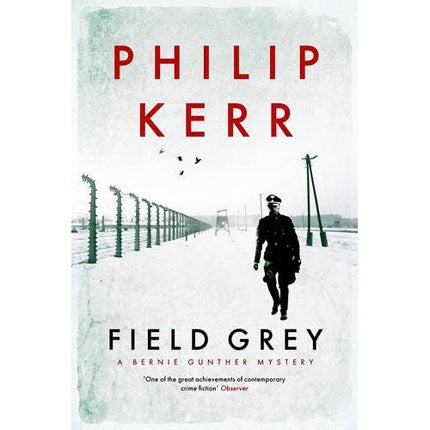Field Grey, By Philip Kerr
Grey areas explored with élan

Your support helps us to tell the story
From reproductive rights to climate change to Big Tech, The Independent is on the ground when the story is developing. Whether it's investigating the financials of Elon Musk's pro-Trump PAC or producing our latest documentary, 'The A Word', which shines a light on the American women fighting for reproductive rights, we know how important it is to parse out the facts from the messaging.
At such a critical moment in US history, we need reporters on the ground. Your donation allows us to keep sending journalists to speak to both sides of the story.
The Independent is trusted by Americans across the entire political spectrum. And unlike many other quality news outlets, we choose not to lock Americans out of our reporting and analysis with paywalls. We believe quality journalism should be available to everyone, paid for by those who can afford it.
Your support makes all the difference.There are two principal ways in which the thriller writer can utilise the form. One is to use all its accoutrements to take the reader on a pleasurable ride; the other is to shake out all the clichés and tackle serious issues.
Philip Kerr has taken the latter course in the latest entry in his Berlin Noir series. With great audacity, Kerr junks all the usual suspense techniques in a narrative that is less to do with a body count than with the protagonist's collusion with his corrupt society. What is more, in Field Grey the reader is asked to draw his or her own conclusions. It is a daring (perhaps foolhardy) move, but Kerr has shown that he is not averse to such risk-taking.
His first novel, March Violets (1989), sutured a Chandlerian private eye, Bernie Gunther, into a boldly realised 1930s Berlin. Other successful books followed – but then Kerr decamped to Hollywood to toil on several big-budget projects that did not come to fruition. After his return to the UK, he set about regaining his credentials as a novelist, rather than a habitué of Tinseltown. Now he is flying high again, his comeback consolidated by his winning the 2009 Ellis Peters Award for historical crime fiction with If the Dead Rise Not.
The new book may downplay the tension of earlier Gunther offerings, but its aspirations are markedly higher. The novel deals with his hero's military service in the SS. Kerr has not revealed this side of Gunther before – perhaps because it would risk alienating readers. In a prologue, set in 1950s Cuba, Bernie is arrested by the Americans and sent to Berlin to answer for his "war crimes". His questioning at the hands of the CIA relates to Eric Mielke, a man whom Bernie has – on numerous occasions – tried to kill. A flashback to 1931 introduces Mielke, while Bernie is an onlooker to brutality committed by German soldiers and SS personnel recruited from France.
There is a price to pay for revealing this part of Gunther's career. It would be safer to distance the protagonist from his monstrous bosses but Kerr eschews the easy option and invites us to make up our own minds about Gunther's compromised actions. Bernie is a member of the SS and kills partisans – but we are reminded that the partisans were killing German soldiers. It is a brave tactic, but a measure of Kerr's skill that such ambiguity makes Field Grey so challenging a novel.
Join our commenting forum
Join thought-provoking conversations, follow other Independent readers and see their replies
Comments